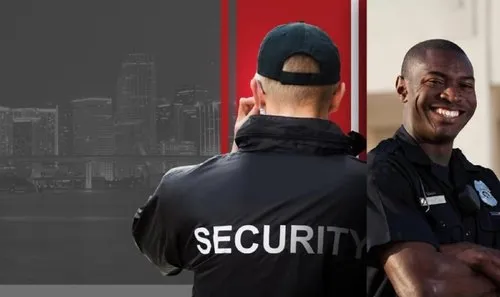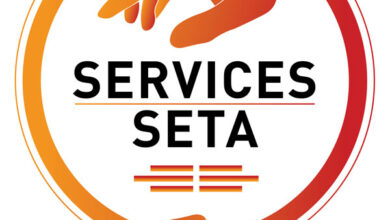security officer vacancies guide

Security guard staff are often seen as the first line of defense, protecting valuable assets, inventory, and property. While this physical aspect of the job is undoubtedly necessary, their responsibilities go far beyond mere asset protection.
Security guards have a crucial role in safeguarding the well-being and safety of people, which is arguably the most important and versatile component of their duties.
As a highly trained and uniformed security professional, you will have developed a keen eye for detecting irregularities in your environment. This observational skill allows you to take proactive measures to identify and address potential threats or concerns.
Equally important is your ability to communicate effectively with people from all walks of life, from the general public to high-profile clients. While controlling access to and from locations may seem like your primary purpose, the true essence of your role lies in your capacity to interact with people in a constructive and diplomatic manner.
Table of Contents
Learning to communicate with empathy, negotiate positive social outcomes, and resolve conflicts seamlessly is essential for an excellent security guard. You don’t have to be an extroverted social butterfly, but you must take pride in providing exceptional customer service at every professional level. Let’s delve deeper into how you can hone and elevate this crucial skillset as a security guard in South Africa.
Effective communication and conflict resolution are the cornerstones of your success, and mastering these capabilities will not only enhance your performance but also contribute to the overall well-being and safety of the individuals and communities you serve.
Liaising With Diverse Clients As a security guard in South Africa, you will have the opportunity to interact with a wide range of clients, each with their own unique needs and expectations.

You may be tasked with assessing and allowing hospitable entry to well-behaved, well-dressed patrons entering a hotel, restaurant, or bar. In these situations, your ability to judge the situation objectively and communicate with tact and diplomacy will be paramount.
However, your role extends far beyond such high-profile settings. You may also find yourself liaising with residential clients, managing access to gated communities, or providing security for corporate events and public gatherings.
Each of these scenarios requires a nuanced approach, as you navigate the diverse needs and concerns of the people you encounter. Effective communication, adaptability, and a keen understanding of human behavior will be your most valuable assets in these interactions.
By honing your interpersonal skills and fostering a collaborative approach, you can build trust, defuse tensions, and create a safe and welcoming environment for all those you interact with.
may be corporate security clients asking you to properly scan and frisk those entering a large event space, for the safety of all involved. You may be a necessary part of a logistics security outfit, ensuring cargo is transported from point A to point B without issue.
Learning your clients and their needs means discussing the scope of the job, learning the structure of your environment, and the tools you have on offer, such as parking gate access buildings and their operation; hours of operation, and guests that have been pre-approved entry.
Depending on the infrastructure of the area, such as guarding a private airfield, you may also need to understand the operational parameters of how staff come and go, and the particular layout of the space. Having these conversations candidly, asking questions if you’re unsure, and exercising your judgement within those guidelines help you become a natural fit within a team.
Dress well, and be punctual. Your clientele understands the need for security, but they rarely wish to think about it every moment of the day.
This is where you come in, to integrate your professional safeguarding duty of care in a seamless, always approachable manner. As a security professional, you may find yourself working with a variety of corporate clients, each with their own unique security needs.
For instance, you may be tasked with properly scanning and frisking individuals entering a large event space, ensuring the safety of all participants. Alternatively, you may be part of a logistics security team, responsible for safeguarding the transport of valuable cargo from one location to another without incident. Regardless of the specific nature of your role, it is essential to thoroughly understand your clients and their requirements.
This involves engaging in open and candid discussions to determine the scope of the job, familiarize yourself with the layout and infrastructure of the environment, and identify the tools and resources at your disposal. This might include understanding the operation of parking gate access buildings, the hours of operation, and the pre-approved entry procedures for guests.
In some cases, such as guarding a private airfield, you may also need to delve deeper into the operational parameters of the facility, including the movement of staff and the particular layout of the space.
By asking questions and exercising your professional judgment within the established guidelines, you can seamlessly integrate into the security team and become a valuable asset.
It is important to remember that your clientele understands the need for security, but they often prefer to focus on their primary business activities rather than constantly thinking about security measures. This is where your role becomes crucial – to provide professional safeguarding duties in a seamless and approachable manner, ensuring the safety and comfort of all involved.
Dressing well and maintaining punctuality are just a few ways you can demonstrate your commitment to your clients and their security needs. Overall, your success as a security professional lies in your ability to understand your clients’ requirements, adapt to the unique challenges of each environment, and deliver your services in a manner that is both effective and unobtrusive.
By fostering open communication, exercising sound judgment, and maintaining a professional demeanor, you can become a trusted and integral part of your clients’ security teams.
Polite, Imperative Language As a security guard, your primary tools are your eyes and your ability to communicate effectively. Being able to approach people confidently, respectfully, and without distraction is crucial to your role. The way you carry yourself will shape how attendees, guests, or visitors perceive you – as an authority figure who commands respect.
This means you need to politely, yet firmly, instruct people on what is expected of them, or how to comply with demands should a difficult situation arise.
Your language and demeanor must convey a sense of professionalism and control, even in tense or confrontational scenarios. Let’s consider a scenario where you notice an event attendee has entered a private, restricted area of the convention space you’re guarding.
First, you would get their attention with a polite, impartial greeting, firmly informing them they’re in the wrong area, and confidently ushering them to the public space. This approach allows you to identify the issue, address it directly, and guide the individual to the appropriate location.
Imperative language is an essential part of this interaction. You would instruct the attendee politely, using clear and concise directives, such as “Excuse me, sir/ma’am, this area is restricted.
Please follow me to the public event space.” Then, you would ask them how they found this area, to gauge if they were genuinely lost or purposefully trespassing. The way you communicate can make all the difference in how the situation unfolds.
By maintaining a professional, authoritative tone while remaining courteous, you can de-escalate potential conflicts and ensure the safety and security of the event.
Your ability to use polite, yet firm, imperative language is a vital skill in your role as a security guard. and report the issue to a team leader should you need to. As you can see, a swift and clean resolution occurred because you took the direct initiative, judged the situation, and firmly led someone to that end result.
This way, you will have handled your authority with care, without causing undue offence, escalating conflict, or demeaning anyone.
The most important element of this is learning to be that obstacle, to say ‘no’ without apology, and to be clinical but also human in how you approach people. Tangential Skills & Your Contract The duties expected of a security guard can differ wildly depending on the scope of the job they’re attending to. However, in this role, like in most job roles, being able to widen your tangential skillset is worthwhile.
For instance, undergoing first aid training as part of your professional development will help you potentially save a life on the premises. It’s not hard to see the value in this. A professional driving license for security purposes may also help you transport high-value personnel from one area to another seamlessly.

As a security guard, your role is multifaceted and requires a diverse set of skills to effectively manage the various situations you may encounter. One crucial aspect of your job is the ability to take direct initiative and make quick, decisive judgments when faced with a challenge.
The passage illustrates a scenario where you took the lead, evaluated the situation, and guided someone to a swift and clean resolution. This approach demonstrates your ability to handle authority with care, avoiding unnecessary offense, escalation of conflict, or demeaning behavior.
The most important takeaway here is the importance of being a resolute obstacle when necessary, learning to say “no” without apology, and maintaining a clinical yet human approach when interacting with people.
Beyond the core responsibilities of a security guard, it is beneficial to expand your tangential skillset. This versatility can significantly enhance your effectiveness in the role. For example, undergoing first aid training as part of your professional development equips you with the knowledge and skills to potentially save a life on the premises, should the need arise.
This extra training not only increases your value as a security professional but also provides a valuable service to the people you are responsible for protecting. Similarly, obtaining a professional driving license for security purposes can be a game-changer.
This skill allows you to transport high-value personnel from one area to another seamlessly, ensuring their safety and security throughout the process.
This added capability demonstrates your commitment to providing a comprehensive and reliable service to your clients. In the ever-evolving landscape of the security industry, the ability to adapt and expand your skill set is crucial.
By continuously seeking opportunities to learn and grow, you can position yourself as a well-rounded and invaluable asset to your employer, always ready to handle any situation that may arise with confidence and professionalism.
Employees responsible for the physical transportation of cash from one location to another will undergo comprehensive training to ensure proper accountability and security procedures are followed.
This training will cover the step-by-step process for transporting cash cases, from the moment the cash is secured at the originating site to its safe arrival at the destination.
Trainees will learn techniques for properly safeguarding the cargo during transit, such as maintaining constant visual surveillance, utilizing tamper-evident seals, and adhering to predetermined routes and schedules.
They will also be instructed on defensive driving tactics to mitigate risks on the road, including heightened observational skills to detect potential threats or suspicious activity.
The training program will emphasize the crucial importance of chain of custody documentation, with trainees learning to meticulously record each stage of the transfer process. This meticulous recordkeeping is essential for upholding financial transparency and ensuring the integrity of the cash transport operation.
Upon completion of the comprehensive training regimen, these specially designated cash couriers will be entrusted with the secure movement of valuable financial assets, equipped with the knowledge and skills necessary to execute their duties with the utmost care and professionalism.
Resolving Conflict Capably The first lesson any capable martial arts instructor will teach their students is how to be disciplined, and how to avoid fights wherever possible.
This principle is equally applicable to security guard roles of all kinds. The core idea is to prioritize de-escalation and conflict resolution through peaceful means, rather than relying on force or confrontation as the default approach.
In the security field, one will inevitably encounter situations where conflict arises. This is simply the nature of the job, as security professionals are tasked with maintaining order and managing potentially volatile situations.
However, the mark of an effective and experienced security guard is their ability to exert control of the situation while remaining proactive, communicative, and calm. From the client’s perspective, they will much prefer a security guard who can prevent a disagreement from escalating into a full-blown conflict.
This not only ensures the safety and comfort of everyone involved, but it also reflects positively on the security provider’s professionalism and expertise. Resorting to additional resources or physical intervention should always be a last resort, as these actions can often serve to further disturb the pleasant enjoyment of other guests or staff. Communication is the key to successful conflict resolution in the security field.
Security guards must be able to firmly, yet politely, state their position, inform individuals that their actions are unacceptable, and call for backup when necessary to resolve the situation quickly and efficiently. Avoiding escalatory language, insults, and unprofessional behavior is crucial, as these actions can quickly escalate a tense situation and undermine the security guard’s author
The ultimate goal of a security professional is to protect people and the location they are responsible for. The best way to achieve this is to neutralize threats before they have a chance to fully develop. This may involve actively engaging with individuals who are displaying disruptive or concerning behavior, and asking them to leave the premises before a full-scale disagreement or altercation can occur.
By taking a proactive and measured approach, security guards can effectively diffuse potentially volatile situations and maintain a safe and secure environment for all. Here is an elaborated version of the original passage: Adopting a ‘tough guy’ persona can be an effective strategy for security guards, conveying a sense of strength, authority, and readiness to respond to any situation that may arise.
This persona projects an image of wisdom, candor, and a heightened commitment to customer service – not just for the client who has hired the security team, but for everyone within the secured space who falls under the guards’ responsibility. Indeed, the role of a security guard extends far beyond simply deterring or apprehending potential threats.
They serve as ambassadors, providing helpful information and directions to visitors, assisting maintenance staff in locating specific areas, and ensuring the orderly and safe evacuation of the premises in the event of an emergency, such as a fire alarm.
These additional duties showcase the multifaceted nature of the security guard’s responsibilities, underscoring the need for a well-rounded skillset that combines physical preparedness with excellent interpersonal and problem-solving abilities.
Projecting a ‘tough guy’ image, when balanced with genuine helpfulness and situational awareness, can be a valuable asset in the security guard’s toolkit. It demonstrates to all stakeholders – clients, staff, and the general public – that the security team is capable, vigilant, and dedicated to maintaining a safe and orderly environment, regardless of the specific challenges that may arise.
This multidimensional approach to the role of a security guard helps to foster a sense of trust and confidence in the overall security measures in place.
.How to get to the top in the security industry!
because most people simply can’t be bothered. Achieving success in the security industry, or any industry for that matter, takes hard work, dedication, and a genuine passion for what you do. There is no magic wand or shortcut that will catapult you to the top of your organization. You have to want it, and you have to be willing to put in the time and effort required to reach your goals.
However, I can assure you that if you follow a few basic guidelines, you will progress in your career, sometimes at a remarkably rapid pace. The golden rule to keep in mind is that you will not be offered promotion or any other beneficial treatment, no matter how great a person you are or how well you perform your duties, if management has never heard of you.
You need to get noticed, and for all the right reasons. If you are new to a company and working in a relatively junior Security Officer role, it’s crucial that you make a good impression right from the start. There are several highly effective ways to do this: Volunteer! Offer to work overtime whenever possible.
Stay late if requested, even if it’s not strictly required. Assist the client or your security company with any extracurricular activities.
Be proactive in helping your supervisor or manager whenever the opportunity arises. Demonstrate your willingness to go the extra mile and go above and beyond the basic requirements of your job.
By taking these steps, you’ll not only make a positive impression on your superiors, but you’ll also develop a reputation as a dedicated, hardworking, and reliable employee. This can open the door to more opportunities for growth and advancement within the organization.

Remember, success in the security industry, or any field, is not something that simply falls into your lap. It requires a conscious effort and a willingness to put in the hard work necessary to achieve your goals. But if you’re willing to do what it takes, the rewards can be substantial, both in terms of career advancement and personal satisfaction.
As the enthusiastic officer who is always there to help, you will soon be noticed. This good impression you make is a great start. To become an even more valuable team member, I strongly recommend getting additional training.
This demonstrates your engagement and enthusiasm for your work. I also strongly advocate Continuing Professional Development or CPD.
This is a formal way to recognize all the activities you perform throughout the year that contribute to your professional knowledge. The Security Institute offers a free CPD scheme, which you should definitely look into for more details.
Being proactive is also crucial. If you notice any problems at work that may cause issues for the client or your security company, make sure to report them.
Additionally, if you have a good idea that could save time or money, speak up. Some companies even have schemes in place that encourage and reward the best ideas from their employees. Always strive to be professional in your conduct. Be diligent and do your job to the best of your ability. Make your reports detailed, accurate, and informative.
Maintain a friendly demeanor – smile and be approachable. Reliability, intelligence, and punctuality are also essential. By following these easy steps, you’ll be well on your way to promotion and advancement into supervisory and operations management roles. The path to success is within your reach, so take the initiative and start making a lasting, positive impression.
As the enthusiastic officer who is always there to help, you will soon be noticed by your superiors and colleagues. This good impression you make right from the start is a great foundation for your future career growth.
To become an even more valuable and well-rounded team member, we strongly recommend seeking out additional training opportunities. This demonstrates your genuine engagement and enthusiasm for your work, which is a highly desirable trait.
we also strongly advocate the practice of Continuing Professional Development or CPD. This is a formal way to recognize and document all the activities you perform throughout the year that contribute to enhancing your professional knowledge and skills. The Security Institute offers a free CPD scheme, which you should definitely look into for more details on how to get started. Being proactive is also a crucial aspect of career advancement.
If you ever notice any problems or potential issues at your workplace that may cause problems for the client or your security company, make sure to report them in a timely and constructive manner. Additionally, if you ever come up with a good idea that could potentially save time or money, do not hesitate to speak up and share it with your superiors.
Some companies even have formal schemes in place that actively encourage and reward the best ideas and suggestions from their employees. In everything you do, always strive to maintain the highest standards of professionalism. Be diligent in your work and do your job to the absolute best of your ability. Make sure that your reports are detailed, accurate, and highly informative.
Maintain a friendly and approachable demeanor – greet people with a warm smile and be responsive to their needs. Reliability, intelligence, and punctuality are also essential qualities that will help you stand out. By following these easy yet impactful steps, you’ll be well on your way to earning promotions and advancing into supervisory and operations management roles.
The path to success is within your reach, so take the initiative and start making a lasting, positive impression on your colleagues and superiors. With hard work, dedication, and a proactive attitude, you can unlock a world of new opportunities and propel your career forward. then move to another company ASAP as your current employer is frankly, useless.
On the job experience and vocational courses, however, can only take you so far. It’s understandable that you may be feeling frustrated with your current employer, who seems to be providing little in the way of meaningful opportunities or support for your professional development. If you feel that your current job is not challenging you or helping you grow, then it may be time to start exploring other options.
Moving to a new company can potentially open up a world of new possibilities and allow you to take your career to the next level. However, it’s important to remember that on-the-job experience and vocational courses, while valuable, can only take you so far.
Truly successful individuals often need to supplement their practical knowledge with a broader understanding of their industry, the latest trends and technologies, and the strategic thinking required to excel in a leadership role.
Continuing your education through more formal academic programs, attending industry conferences and workshops, or even seeking out a mentor can all be effective ways to round out your skillset and prepare yourself for greater responsibilities and opportunities.
The decision to leave your current employer should not be made lightly, as it can have significant impacts on your career trajectory and personal life.
security However, if you feel that your current situation is holding you back, then exploring new options may be the best path forward. Just be sure to approach the transition thoughtfully and strategically, so that you can maximize your chances of finding a role that truly aligns with your goals and aspirations.





